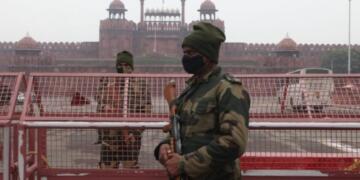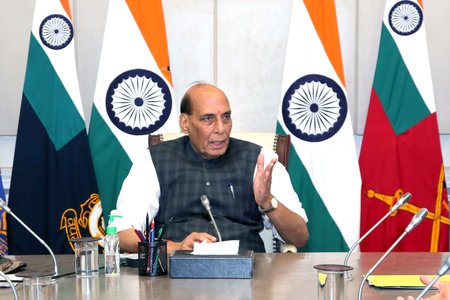In 1975, while India was gripped by a state of Emergency, a young Rajnath Singh, barely 24 years old, was in prison for protesting against what he believed was an assault on democracy. But behind the slogans, jail cells, and crackdowns, lay a deeply personal tragedy that has rarely been spoken about: he couldn’t attend his own mother’s funeral.
Rajnath Singh found himself imprisoned for opposing the Emergency imposed by then Prime Minister Indira Gandhi. As an active participant in the JP Movement, he was appointed convenor for Mirzapur-Sonbhadra and played a key role in mobilising resistance against what many called the rise of authoritarian rule.
His mother had suffered a brain haemorrhage shortly after the Emergency was extended. The shock and distress of knowing her son remained behind bars proved too much. She spent 27 days in a hospital but ultimately passed away — and Singh, detained without trial, was not granted parole. While his brothers performed her last rites, he was hundreds of miles away, confined within the walls of a jail cell.
“I got my head shaved inside the prison,” Singh would later recall, his voice calm but the pain still evident. “I wasn’t even allowed to say goodbye.”
Arrested at Midnight, Held in Solitary Confinement
One night, around midnight, police arrived at Singh’s home with a warrant. He was arrested and taken directly to jail, where he was kept in solitary confinement. Conditions were harsh — no books, no contact with the outside world, and bare minimum food: a brass utensil of daal and dry chapatis handed out daily.
Despite being newly married, Singh was determined to stand his ground. He described how he and fellow activists made people aware of the dangers of the Emergency and the creeping erosion of civil rights.
As he was being transferred from Mirzapur Jail to Naini Central Jail, his mother came to see him at the railway platform.
She told him, “No matter what happens, don’t apologise.” Her strength in that moment moved even the policemen to tears. Tragically, she passed away after 27 days in hospital. Singh was not granted parole, not even to perform her last rites. He shaved his head in jail. His brothers conducted the funeral in his absence.
Parole and Re-arrest
Months later, Singh was granted parole, but the reprieve was short-lived. He resumed his work, mobilising people once again against the Emergency — and was re-arrested even before his parole had officially ended.
He emphasised how his imprisonment and personal loss stood in sharp contrast to the present-day accusations from the Opposition of “dictatorship” under the current government. “Those who imposed real dictatorship now accuse others of the same — they forget their own history,” he remarked.
Why Was the Emergency Declared?
The Emergency was proclaimed on June 25, 1975, under Article 352 of the Constitution, citing “internal disturbances” as justification. But the roots were political.
Following her massive victory in the 1971 Lok Sabha elections, Indira Gandhi’s election was challenged by Raj Narain, who accused her of misusing government machinery. On June 12, 1975, the Allahabad High Court found her guilty of electoral malpractice and disqualified her from Parliament. The ruling sparked a national political crisis.
Instead of stepping down, she invoked Article 352 of the Constitution, allowing her to suspend fundamental rights, censor the press, and arrest opposition leaders without trial. President Fakhruddin Ali Ahmed signed the Emergency proclamation that night.
As protests swelled across the country under the leadership of Jayaprakash Narayan, Gandhi declared a nationwide Emergency.
- A Democracy Suspended
During the 21 months of Emergency: - Civil liberties were suspended.
- Over 100,000 political opponents and activists were jailed without trial.
- The press was brought under strict censorship.
- Mass sterilisation drives and slum evictions were carried out.
- Opposition parties were crushed, and dissent became a punishable offence.
- The Rashtriya Swayamsevak Sangh (RSS) and student movements were banned.
Singh’s experience was one of thousands — a generation of political workers who were detained, tortured, and silenced for simply defending democracy.
Rajnath Singh’s journey through prison, grief, and principled resistance stands as a symbol of personal sacrifice and unwavering commitment to democratic ideals. As India marks 50 years since the Emergency, his story serves as a stark reminder of the real cost of political repression — and the resilience needed to stand against it.























